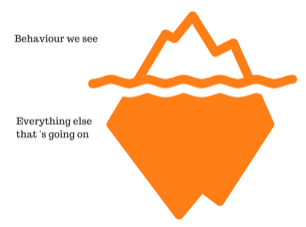Working in tech is full of challenges and opportunities: deadlines to hit; bugs to find; outdated views and opinions to navigate. These examples only come from the professional elements of our world. There are at least as many personal elements. It’s common for people to become frustrated when what happens falls short of what they expect. Being able to adapt to these differing circumstances is often a key determinate of our success and happiness. That’s a lot easier to write than do. Particularly when you’re ‘right’ and the other person or situation is ‘wrong’. It’s easy to get caught out when there’s a difference. So, what can you do to improve things?
Here are three things to consider:
1) Reality is reality
2) What you see on the surface isn’t all that’s going on
3) Get great at asking better questions

Reality is Reality
It’s easy to get tricked into thinking that we have it right. In fact, there are many people who pursue a whole series of unhelpful behaviours when reality falls short of what they want. Look around the concourse of any train station when cancellations get announced if you want to see evidence of that. I’m not suggesting for one minute that it’s not frustrating when this happens. However, being frustrated is typically a disempowering place to operate from. Let’s be clear. There are times when you are right, yet the current reality doesn’t reflect this. Once we accept the reality of the situation, we put ourselves in a stronger position to do something constructive and influence the situation for the better.
So how could this relate to software development? You’ve met with someone you are developing code for. They’ve set out what they’d like to see happen and you’ve agreed on a timescale. You do what they ask and then find yourself on the receiving end of a host of unhelpful comments about the fact that “you’re late”. You are ‘right’, you have done what was asked. You’ve therefore built your expectation about what’s reasonable. Now you find its come into contact with reality. It would be easy to get defensive. I know in certain situations I can. After all, you did what was asked. Being defensive in this situation is unlikely to help. Why?
What you see on the surface isn’t all that’s going on

There are multiple reasons as to why a person behaves as they do. The number of variables in play that make up the reality we face is huge. You can believe that the person sitting in front of you is operating as they would ideally like. Unfortunately, there are a whole host of things going on in their world you just can’t see. From work pressures to home pressures or simply the state of their health. Or even an on-going argument they are currently engaged in with your boss. You can’t see these things on the surface. It’s rare they will tell you. And in the case of the argument with your boss, they are likely taking out their frustration on you. You are just an innocent victim. So, what can you do?
Get great at asking better questions

The more proficient we get at asking questions the more we can do to understand what’s really going on. These questions start with the ones we ask ourselves in our heads. Here are the three categories to consider.
1) Objectivity questions
2) Questions to improve your understanding
3) Take action questions
Questions:
Objectivity questions: they help us put what is happening into perspective. Using a scale or time can help here. For example: how important is this situation on a scale of 1 – 10 (where 10 is death)? Or, how important will this situation be in three years? Many of the situations we face probably won’t score highly or be particularly relevant in the future. What this does do is allow us to operate from a position of improved objectivity and perspective.
Questions to improve your understanding: This next category is where we really look to understand what is going on, often beneath the surface of a current situation or mindset. Example questions in this category can be: what assumptions could I be making about this? If I had what I want; how would I know? What would ‘shades of grey’ look like between these two positions? The powerful thing about this category is that improved understanding can open up alternatives to move a situation forward.
The final category takes your improved objectivity and understanding and turns them into positive action. Examples include: who could I involve to improve this? What could I do next that would make me feel proud? What’s the smallest step I could take to build momentum? The last question is aimed at particular situations where we might get stuck or overwhelmed. Of course, questions will only be of real benefit if you follow on and take the action required.
We can all get caught out. Literally every day the gap between expectation and reality presents itself. We just don’t need to roll-over and accept whatever shows up. We do have a choice about how we respond. Getting to the point where we work with reality and not our preconceived expectation puts us in a stronger position to improve our performance and results. And the really great news is that not only will this help at work, it can also help in all the situations you face. Does that sound like something that could be of benefit to you?
About the author

Damian Piper founded Effective Challenge to work with individuals and teams to improve their performance and results. He’s passionate about people recognising and realising their potential. A strong believer that your past and current circumstances don’t have to dictate your future. Previously, he has worked in senior leadership positions in the UK Government, leading digital transformation programmes which bring people, technology, and process together in pressurised environments.. He’s an MBA, a Fellow of the IET and certified MBTI practitioner.
Follow Damian: Effective Challenge | LinkedIn | Facebook








